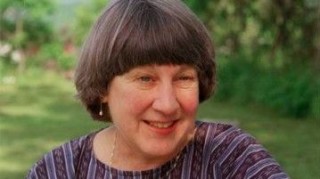Born in Elgin, Illinois, Meadows was educated in science, receiving a B.A. in chemistry from Carleton College in 1963, and a Ph.D. in biophysics from Harvard in 1968. After a year-long trip with her husband, Dennis Meadows, from England to Sri Lanka and back, she became, along with him, a research fellow at MIT, as a member of a team in the department created by Jay Forrester, the inventor of system dynamics as well as the principle of magnetic data storage for computers. She taught at Dartmouth College for 29 years, beginning in 1972. She died in 2001 from a bacterial infection.
Meadows was honored both as a Pew Scholar in Conservation and Environment (1991) and as a MacArthur Fellow (1994). She received the Walter C. Paine Science Education Award in 1990. Posthumously, she received the John H. Chafee Excellence in Environmental Affairs Award for 2001, presented by the Conservation Law Foundation.
Meadows wrote a weekly column called “The Global Citizen,” commenting on world events from a systems point of view. Many of these columns were compiled and published as a book. Her work is recognized as a formative influence on hundreds of other academic studies, government policy initiatives, and international agreements.
Meadows was a long-time member of the United States Association for the Club of Rome, which instituted an award in her memory: “The US Association for the Club of Rome Donella Meadows Award in Sustainable Global Actions.” This award is given to an outstanding individual who has created actions in a global framework toward the sustainability goals Meadows expressed in her writings. In 1972, she was on the MIT team that produced the global computer model “World3” for the Club of Rome, providing the basis for The Limits to Growth. The book reported a study of long-term global trends in population, economics, and the environment. The book made headlines around the world and began a debate about the limits of Earth’s capacity to support human economic expansion−a debate that continues to this day. In 1982, Donella Meadows and Dennis Meadows created an international “network of networks” for leading researchers on resource use, environmental conservation, systems modeling, and sustainability. Since its foundation, the members have met at Lake Balaton, in Hungary, every autumn. While the formal name for the network was the International Network of Resource Information Centres (INRIC), it became more popularly known as the Balaton Group based on the location of its meetings. Donella Meadows was the founder of the Sustainability Institute, which combined research in global systems with practical demonstrations of sustainable living, including the development of a cohousing (or ecovillage) and organic farm at Cobb Hill in Hartland, Vermont, in the United States. In 2011, the Sustainability Institute, originally located adjacent to Cobb Hill, was renamed the Donella Meadows Institute and moved its offices to Norwich, Vermont. Additional organizations that sprang from the Sustainability Institute include Sustainable Food Lab, Climate Interactive and Sustainability Leaders Network. In 1990, Donella Meadows published the State of the Village report under the title, “Who lives in the ‘Global Village’?” which likened the world to a village of 1,000 people. Since then, “If the world were a village of 100 people”−derived from her work but further reducing the numbers to those of a village of 100 people−has been published by others in English, Spanish, and Japanese. Meadows published Leverage Points: Places to Intervene in a System, one of her best-known essays, in 1999. It describes what types of interventions in a system (of any kind) are most effective, and which are least effective.

